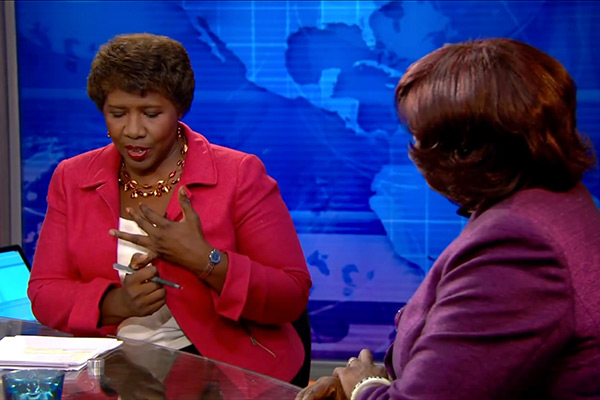
Fighting for International Religious Freedom to End Persecution
- By Alison Lesley --
- 03 Oct 2013 --

Gwen Ifill interviews Suzan Johnson Cook, International Religious Freedom Ambassador, about the connection between recent terrorist attacks and religious freedom.
Gwen Ifill, PBS journalist, set out to seek if whether last week’s church bombing in Pakistan, recent targets on Christians in Egypt and most recently the Mall attacks in Kenya, were just coincidences or if there is a wider trend emerging.
To try and decipher these patterns, she interviewed U.S Ambassador at Large for International Religious Freedom Suzan Johnson Cook.
Cook insists the recent attacks on religious groups are not just recent occurrences; they’ve been happening all throughout history. Our constitution protects our right for religious freedom, but that’s not so throughout the entire world.
All too often she and her department hear about instances of religious persecution, of people being maimed for going against the doctrine of the national religion. “Religious minorities all over the world” are targeted.
Part of Cook’s responsibilities as a U.S. Ambassador for International Religious Freedom is to protect these religious minorities and persuade governments to do the same. To do that without seeming to force American values on other countries, Cook points to the universal declaration of human rights, an international agreement. She’s visited 26 different nations trying to use tactics of public diplomacy to discuss religious freedom, as well as an annual report on religious freedom, complete with trends from 199 countries throughout the previous year.
When asked about the term her department uses, “countries of particular concern,” Cook states there are eight countries they’re consumed with at the moment. The list of target countries may change at any time, as they are always promoting and monitoring the nations. One of their ongoing challenges is examining “systemic causes” for religious freedom, and studying which laws should be modified or repealed, looking especially at laws that protect or harm religious minorities. Cook also highlights their success in freeing a Christian pastor held captive in Iran, Pastor Nadarkhani, and points out their efforts to free Pastor Saeed Abedini, currently imprisoned through their partnerships.
Cook believes there is a strong connection between religious tolerance, freedom, and global security. She says:
“We have found where there is religious freedom, there is more stability. And where there is the absence of religious freedom, there is more chance for religious extremism, extremist violence. And so there’s definitely a connection. So, we try to integrate religious freedom into our foreign policy and into our national security.”
Although the fight for religious freedom is not publicized in the media daily, it’s still being fought behind the scenes. Success comes in the form of small victories, such as Cook’s visit to Liberia this month – a decade ago Muslim and Christian women united to insist religious wars must stop. Just this year, the Liberian president signed an agreement to defend religious freedom.
Cook finishes by implying that just because progress towards worldwide religious freedom isn’t always obviously measurable, the International Religious Freedom department continues to work towards their goal, small victory by small victory.
Resources
- “How Promotion of Religious Freedom Can Help Prevent Extreme Violence” – Interview Transcript
- Suzan Johnson Cook on Facebook
- Office of International Religious Freedom
- HumanRights.gov




















